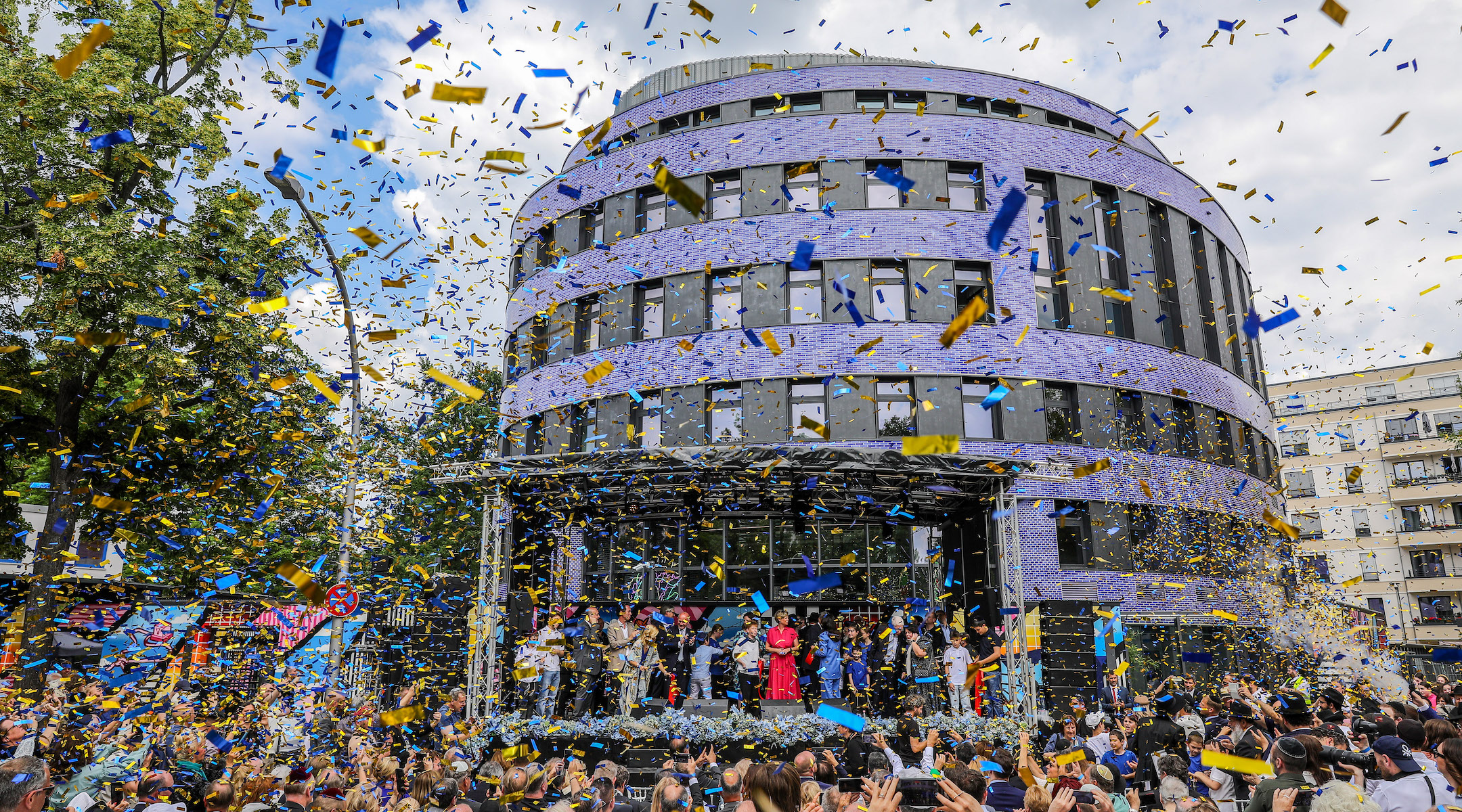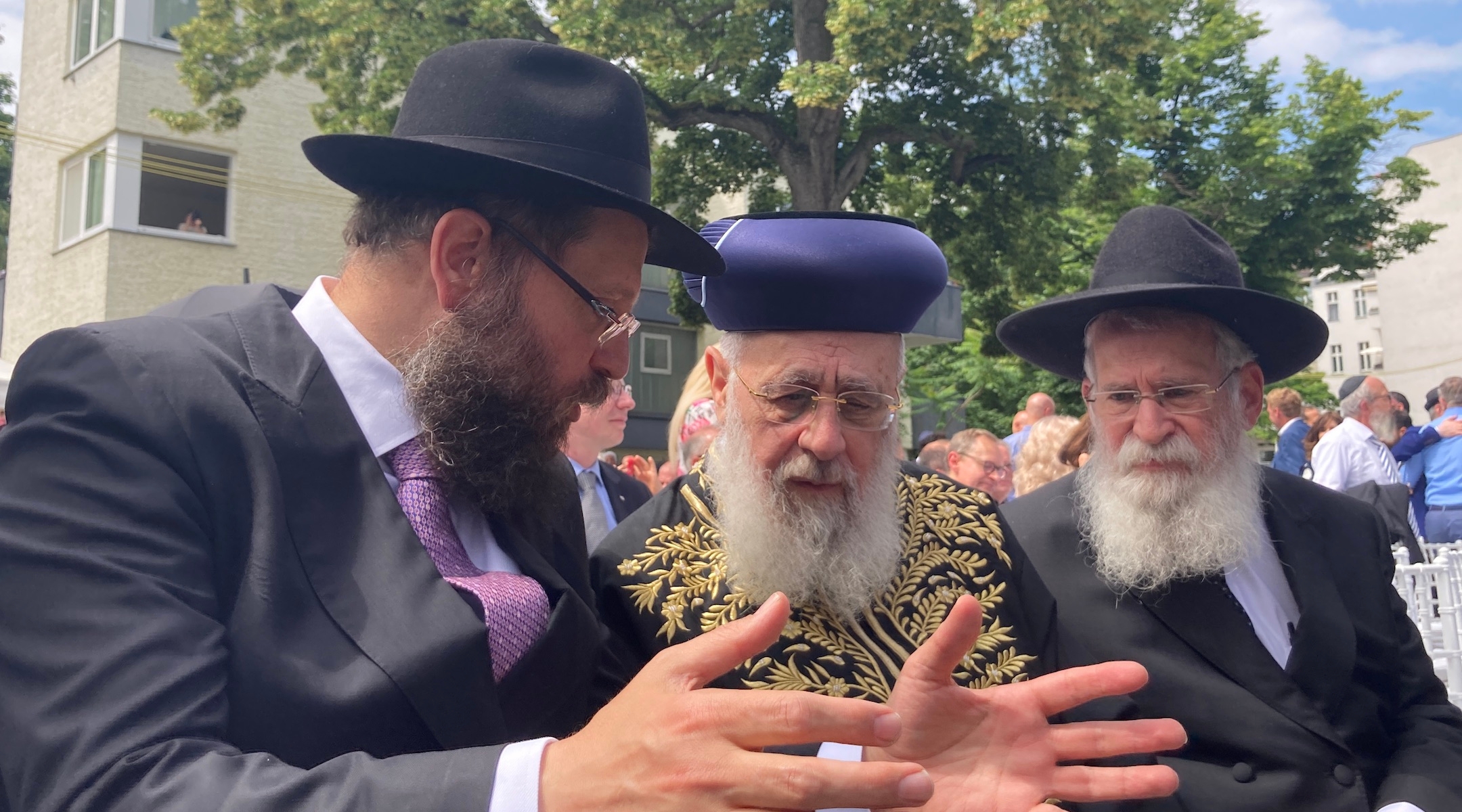Chabad opens Germany’s largest Jewish center since WWII
The Pears Jewish Campus, which covers over 80,000 square feet and cost $43.7 million to build, is ‘a great example of the renaissance of Jewish life in Europe,’ said the head of the European Jewish Association

The Pears Jewish Campus in Berlin is seen at its inauguration ceremony, June 25, 2023. (Omer Messinger/Getty Images)
BERLIN (JTA) — Germany’s largest Jewish center since World War II and one of the largest of its kind in the world opened on Sunday in Berlin with a dedication ceremony that included diplomats and communal leaders from around the world.
The Pears Jewish Campus, which covers over 80,000 square feet and cost $43.7 million to build, will be run by Berlin’s Chabad-Lubavitch community. By the next school year in the fall, all of the community’s current pupils in Berlin — a reported 550 in all — will move out of their current locations around the city and into the new building.
The campus also features an indoor basketball court and gym that can double as a lecture or reception hall, a movie theater, a music studio and a kosher deli. The seven-story building, which is entirely open to the public, stands out like a sapphire situated on an otherwise typical Berlin street, with blue glazed brick-work on a curved facade.
Local Chabad director Rabbi Yehuda Teichtal told the Jewish Telegraphic Agency that he was grateful to finally see the campus open after four years of construction that continued uninterrupted during the coronavirus pandemic.
“It’s very beautiful, it’s a place for exchange,” he said. The idea is to “create awareness and knowledge of what Jewish life is about. It’s not just about fighting antisemitism. It has to be connected with positivity.”
“There are millions of Germans who don’t even know what Jews are,” he elaborated at Sunday’s ceremony. “Let’s have positive cooperation, face to face, through dialogue, through shared, positive, joyful, lively, future-oriented Jewish life.”
Approximately 90,000 Jews in Germany are members of congregations, from Reform to Conservative to Orthodox, under the umbrella of the Central Council of Jews in Germany; another 100,000 who identify as Jews are unaffiliated. When Teichtal came to the German capital with his wife, Leah, in 1996, there were fewer than a handful of Chabad congregations in Germany. Today, there are 20 Chabad communities across the country, according to the Chabad website.
Twenty years ago, Teichtal started the tradition of lighting a large Hanukkah menorah at the city’s iconic Brandenburg gate, within view of the U.S. embassy. His mantra has always been to bring light into the darkness. On Sunday, too, he spoke of the new “beacon of light and tolerance” that has risen on the lot facing Westfaelsicher Street.
He has long been focused on raising funds to support new Jewish schools in the capital. Chabad kindergarten, elementary and high schools have functioned alongside other Jewish educational offerings here, including those funded by the Berlin Jewish Community and by the Ronald S. Lauder Foundation.
The new site will also have programs for adults and for people of all faiths, Teichtal said. The building has direct access through an inner courtyard to a Chabad synagogue and the Szloma Albam House community center, which opened in 2007 in a former Berlin utilities company building transformed by architect Sergei Tchoban. He also designed the new building.

The new campus bears the name of its major funder, the British-based Pears Foundation, but contributions also came from the federal and state governments, private companies, foundations and other private donations.
Speaking from Brussels on Friday, Rabbi Menachem Margolin, head of the European Jewish Association, called the new campus “a great example of the renaissance of Jewish life in Europe, in Germany, and in Berlin in particular.”
The greatest danger to that renaissance, he said, comes from political threats to religious freedom, including the rights to perform ritual circumcision and to carry out kosher slaughter. He called the Berlin campus “an example to all Jewish communities across Europe.”
“If they approach Jews in the right way, as Rabbi Teichtal does, they will see more Jews coming back to Judaism,” he said.
The campus is cut off from the street by a wall and a glass fence. The protective wall is an eye-catcher, decorated with stylized graffiti, sending a message of welcome rather than fear, said Ron Prosor, Israel’s ambassador to Germany.
“People who have clichés about Orthodox Jews will be surprised here,” said Prosor, whose father fled Berlin to then-Palestine with his parents in 1933. “They will be surprised by the colorful graffiti wall and by the impressive entrance, but much more by the openness with which they will be received.”
Among the speakers at the dedication ceremony were Israel’s Chief Sephardic Rabbi Yitzhak Yosef; Berlin Mayor Kai Wegner; Central Council of Jews in Germany President Josef Schuster; and Raed Saleh, a member of the Berlin Senate.
Saleh, who is of Palestinian background and was born in the West Bank, called the new campus “a statement – set in stone – on behalf of freedom in our country, freedom in Berlin, freedom of our people.”
This article originally appeared on JTA.org.
A message from our Publisher & CEO Rachel Fishman Feddersen

I hope you appreciated this article. Before you go, I’d like to ask you to please support the Forward’s award-winning, nonprofit journalism during this critical time.
We’ve set a goal to raise $260,000 by December 31. That’s an ambitious goal, but one that will give us the resources we need to invest in the high quality news, opinion, analysis and cultural coverage that isn’t available anywhere else.
If you feel inspired to make an impact, now is the time to give something back. Join us as a member at your most generous level.
— Rachel Fishman Feddersen, Publisher and CEO






















